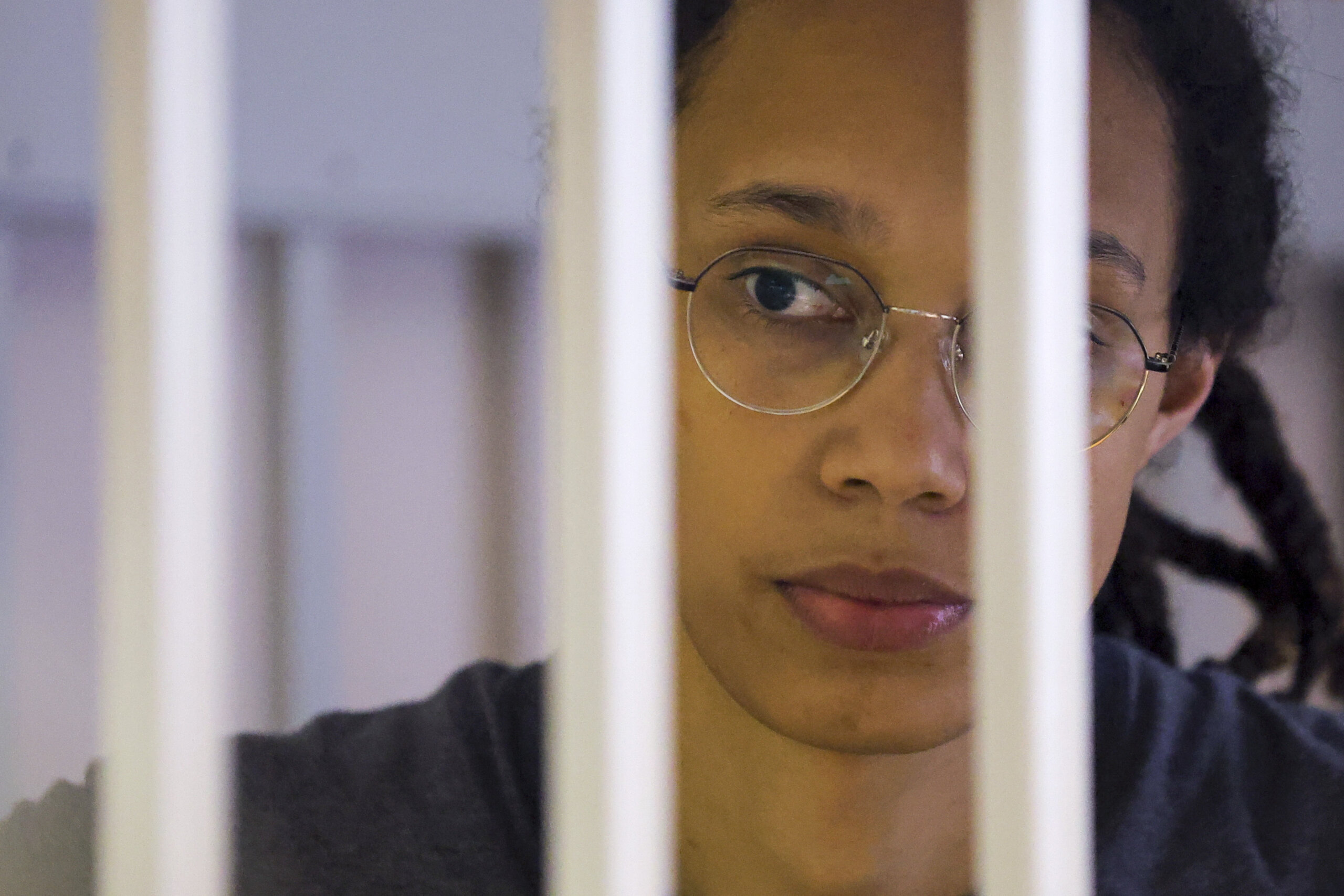A grim verdict came down Tuesday for WNBA star Brittney Griner’s hopes of returning to the United States, after her appeal was rejected and her nine-year sentence to a Russian penal colony was upheld.
Griner, an openly queer Black player and two-time Olympic gold medallist for the U.S. national basketball team, was first detained in February and charged with drug smuggling for possessing two cartridges of cannabis oil. Her detention has been the subject of international scrutiny of Russian officials, considering the dubiousness of the charges and timing related to Russia’s invasion of Ukraine in increasing tensions with the U.S.
While there has been repeated talk of a prisoner swap between the U.S. and Russia in recent months, the American government has still not managed to free Griner. There have been repeated calls for U.S. president Joe Biden to do something, from Griner’s fans, friends and family over the past months, in addition to coordinated public pressures like pre-game messages from prominent NBA players during last week’s opening week of play.
With her appeal rejected, she is now set to serve upward of nine years in a Russian penal colony—essentially a prison camp—with some sort of prisoner swap her only likely path for release.
“She had hopes for today,” Griner’s lawyers said in a statement following the ruling, “as each month, each day away from her family and friends matters to her.”
In a statement Tuesday, the WNBA continued to call for Griner’s release, saying Griner is “very clearly a hostage” and being used as a “political pawn.”
Here’s what you need to know about the continued detention of the WNBA star and what could happen next.
What does Brittney Griner’s appeal rejection mean?
On Tuesday, a Russian judge rejected Griner’s appeal and left her original sentence—which was issued in early August—in place, with slight modifications to account for Griner’s time served since her initial arrest on Feb. 17.
Griner and her legal team had attempted to argue that the sentence of nine years was unfair under Russian law, and that Griner had no criminal intent in bringing a small amount of cannabis oil—for which she has a medical prescription—into the country.
“I’ve been here almost eight months, and people with more severe crimes have been given less than what I was given,” Griner said Tuesday in a courtroom video appearance from the prison colony where she is currently being held.
“I really hope the court will adjust this sentence,” she said before the judgment, “because it has been very, very stressful and very traumatic to my mental [health] and my psyche and being away from my family, not being able to communicate.”
Russian penal colonies have a reputation as having incredibly harsh conditions for prisoners, akin to concentration camps. The barrack- and dorm-style detention complexes house prisoners convicted of more minor charges like Griner’s drug charges, where they spend hours doing hard labour. High-profile prisoners including Pussy Riot singer Nadezhda Tolokonnikova and attorney Alexei Navalny reported 16-hour workdays, constant surveillance and abuse.
There’s also an increased risk for specific prisoners in Griner’s demographic: both political prisoners and queer prisoners have been reportedly subject to particular abuse, including a Chechen prisoner who was reportedly physically abused by security guards who suspected he was gay.
Why is Brittney Griner detained in Russia?
It’s important to remember the circumstances of Griner’s detention: namely that her sentence still remains questionable in the eyes of a multitude of legal experts.
The WNBA player was competing in Russia during the U.S. league’s off-season, as many players do, when she attempted to board a flight in Moscow on Feb. 17. Airport officials stopped her and seized less than one gram of cannabis oil from her luggage, arresting her on drug-smuggling charges. Cannabis is classified as a narcotic in Russia.
Her detention came at a time of escalating tensions between the U.S. and Russia as the latter was set to invade Ukraine.
Griner pleaded guilty this summer to drug-smuggling charges, arguing that she accidentally packed the cannabis in a rush. Her legal team has produced proof that in 2020, she was prescribed cannabis for chronic pain related to sports injuries.
Her trial took place in late July, and she was sentenced in early August.
“I never meant to hurt anybody, I never meant to put in jeopardy the Russian population, I never meant to break any laws here,” Griner said prior to the court’s verdict. “I made an honest mistake and I hope that in your ruling that it doesn’t end my life here. I know everybody keeps talking about political pawns and politics, but I hope that that is far from this courtroom.”
What is the U.S. government doing to free Brittney Griner?
Since Griner’s initial arrest, there have been repeated calls to U.S. president Joe Biden to use the U.S.’s power to free her. After months of public pressure, Griner’s wife Cherelle Griner met with Biden last month.
U.S. officials have proposed a prisoner swap with Russia involving Griner and Paul Whelan, another American currently imprisoned in Russia, being exchanged for Russian arms trafficker Viktor Bout, but it has so far gone nowhere, according to U.S. officials who told CNN last week that Russia has been “non-responsive.”
In a statement Tuesday, U.S. national security advisor Jake Sullivan called the appeal ruling a “sham judicial proceeding.”
“President Biden has been very clear that Brittney should be released immediately,” he said. “The administration remains in regular touch with representatives of the families, and we continue to admire their courage in the face of these unimaginable circumstances.”


 Why you can trust Xtra
Why you can trust Xtra


